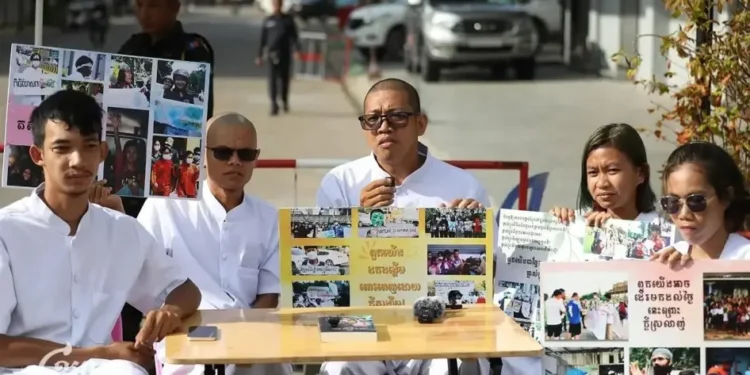A Cambodian court has sentenced ten environmental activists from the conservation group Mother Nature to prison terms ranging from six to eight years. The activists were convicted of plotting against the government and insulting the king, charges that human rights organizations argue are part of a broader effort to silence dissent.
The trial, which concluded on July 2, 2024, has drawn significant criticism from international human rights groups. Human Rights Watch has condemned the proceedings, describing them as a means to “muzzle criticism of government policies.” The convictions pertain to Mother Nature’s activities between 2012 and 2021, including efforts to document pollution in the Tonle Sap River, Southeast Asia’s largest freshwater lake and a vital fishing area.
Mother Nature has also highlighted issues such as the illegal filling of lakes in Phnom Penh, illegal logging, and the destruction of natural resources throughout Cambodia. The additional charges of insulting the king were directed at three activists and are based on remarks made during a leaked internal Zoom meeting about political cartooning.
Following the sentencing, four of the activists were immediately detained by police outside the court, according to AFP reports. The remaining six were tried and sentenced in absentia, including Alejandro Gonzales-Davidson, Mother Nature’s co-founder, who was deported nearly a decade ago.
The verdicts come amid increasing concerns about freedom of expression in Cambodia under Prime Minister Hun Manet, who succeeded his father Hun Sen last year. Human Rights Watch condemned the trial as an attempt to stifle opposition, with Gonzales-Davidson describing the regime as “inhumane and cruel” in a statement to Reuters.
The Cambodian government, however, has denied that the trial was politically motivated, maintaining that it only prosecutes individuals who commit crimes. This case is the latest in a series of legal actions against environmentalists, who have faced threats, arrests, and even killings over the past decade.
From 2001 to 2015, Cambodia experienced a significant loss of primary forests, with deforestation rates accelerating faster than anywhere else globally, according to the World Resources Institute. Much of the deforested land has been allocated to businesses, leading to further environmental degradation and displacement of local communities.
Three of the activists sentenced this week had previously been imprisoned for organizing a peaceful protest against the filling-in of a lake in Phnom Penh to make way for real estate development. This ongoing struggle between environmental preservation and economic development continues to be a contentious issue in Cambodia.
















